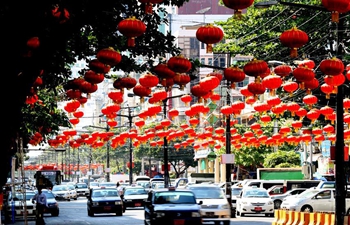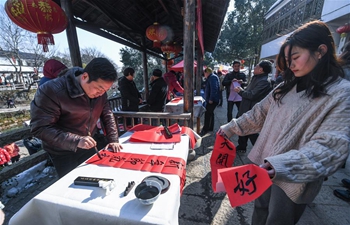by Burak Akinci
ANKARA, Feb. 4 (Xinhua) -- Turkey has been providing the best conditions for 3.5 millions of displaced Syrians with a generosity commended by the international community and hopes that its military operation in northern Syria will speed up their return amid fears of internal anti-refugee tensions.
The Turkish military's operations in Syria will continue "until all terrorists are fully eliminated" and around 3.5 million Syrian refugees return to their homes, the Ankara government announced last week after a top security summit held on the fourth day of "Operation Olive Branch" in Afrin against the People's Protection Units (YPG) considered as the Syrian affiliate of the Kurdistan Workers' Party(PKK) waging an insurgency inside Turkey.
"Our operations will continue until the separatist terror organization is fully cleared from the region and around 3.5 million Syrians who are now sheltered in Turkey are able to securely return to their homeland," Presidential Spokesman Ibrahim Kalin said in a written statement after the summit.
The incursion is on its second week now and shows no signs of slowing down. More than 900 "terrorists" and 13 Turkish soldiers have been killed, according to a statement released on Friday by the Turkish Armed Forces.
Turkish President Recep Tayyip Erdogan announced that 130,000 Syrians have returned to their homeland in the northern city of Jarablus after the previous incursion of the Turkish military in Syria in 2016-2017, because "Turkey is making it secure for them to go back," revealing a major change in Turkey's policy towards its massive population of displaced Syrians.
Erdogan also vowed to create the necessary humanitarian conditions, complete with infrastructure and superstructure facilities, in "areas cleared of terrorists," so that all Syrians could return to their homes.
TURKEY CHANGING ITS REFUGEE POLICY?
"This change on Syrian refugees marks an important U-turn for the Turkish government," told Serkan Demirtas Hurriyet Daily News Ankara representative to Xinhua, explaining that until now the official discourse was trying to integrate as much of migrants as possible.
Turkey has long been providing the best conditions for the millions of displaced Syrians with a generosity to the tune of 30 billion U.S. dollars as repeatedly stressed by the government. Only 300,000 Syrians are sheltered in camps while the rest are scattered in dire conditions across Turkey.
Many government agencies have already begun work to integrate Syrian refugees on the grounds that many of them will choose to stay in Turkey or wait to be resettled in a third country.
Serious academic studies conducted last year showed that 52 percent of Syrian refugees want to stay in Turkey, with 74 percent seeking Turkish citizenship so they can start formally working and building a life in Turkey.
According to a recent parliamentary study, 60,000 Syrians have been granted citizenship in the last six years.
Professor Murat Erdogan, a prominent scholar on refugees and migration issues, believes that most of the Syrians, up to 80 percent, are here to stay in Turkey. He argues that there is a "change of rhetoric" in the Turkish government approach to the refugee crisis because of "political considerations" in the run-up to presidential and parliamentary elections planned for 2019.
However, "Sensing these people massively back will not be easy nor realistic," he emphasized during a recent seminar on refugees organized by the American Brookings Institution.
"We are in Turkey since the end of 2014 when Aleppo (norther Syria) was being ravaged by the war. We lost everything that we had and came with only a couple of luggage," explained to Xinhua Salim Hemdo, a 36-year-old mechanical technician settled in Ankara's Dikmen district with this family.
This man, belonging to the Turkmen minority of Syria who are of Turkic origin, insisted that he is eventually prepared to return to his homeland "if Turkey can arrange for their security" there and hopes that the ongoing military incursion could perhaps do that.
"We monitor news reports every day to learn how much the (Turkish) army seized territory from the YPG in Afrin and we are excited about the outcome," Hemdo added.
DISCOMFORT AGAINST SYRIANS ON THE RISE
Demirtas also question the reasons behind Erdogan's claims for Afrin, arguing that one likely reason is that public discomfort in Turkey vis-a-vis the Syrians is on the rise.
According to the parliamentary panel's finding, Istanbul ranks first in the list of cities hosting refugees, with 517,000 Syrians currently living there. This number is roughly about 700,000 according to independent surveys, more than the population of many entire cities in western countries.
The issues may or may not be linked, but Istanbul ended up voting against the government-led referendum shifting Turkey to an executive presidential system in April 2017 would explain Ankara's refugee policy changes, Demirtas explained.
Recent press reports suggest that polls conducted by companies linked to the ruling Justice and Development Party (AKP) led by Erdogan, showed that local populations in especially big cities where the AKP has a strong political support, are no more willing to shoulder or welcome Syrian refugees because of mainly economic problems of their own.
Erdogan said that Turkey has spent around 30 billion U.S dollars on Syrians in an economy that shows signals of dwindling after a decade of prosperity for the lower income classes now under the burden of high inflation and unemployment which causes increased sectarian frictions.
A new report by the International Crisis Group (ICG) published this week confirmed this trend and raised alarm bells over the future of the Syrians in Turkey where acts of aggression against them still remain very rare.
The report is based on research in refugee-dense neighborhoods of Istanbul, Ankara and Izmir, where many Syrians are striving to support themselves through informal jobs. The potential for anti-refugee violence is the highest in Turkey's three biggest cities, which host over a fifth of the Syrians.
Incidents of inter-communal strife trebled in the second half of 2017 compared to the same period in 2016. While the ICG recorded 35 deaths last year, the victims mostly Syrians, the number of violent incidents is likely much higher. The report reads "residents of neighbourhoods experiencing high levels of tension say there are many more unreported incidents of violence involving refugees."
One source of resentment is the public perception that Syrians receive preferential access to public services and assistance.
Young Syrian men tend to roam in large groups, "which makes them appear hostile and dangerous to locals," when in fact they do so for their own protection. A survey published in December 2017 found that 75 percent of Turkish citizens did not believe they could co-habit harmoniously with Syrians.
"Even communities with religious and ideological affinity to the government," the ICG observed, "appear to be turning from compassion to grievance or impatience," said the report.
The ICG argued "by ignoring or downplaying tensions, the government has allowed hostilities to reach a boiling point in some refugee-dense communities," and predicted that most Syrian refugees are likely to remain in Turkey.
















